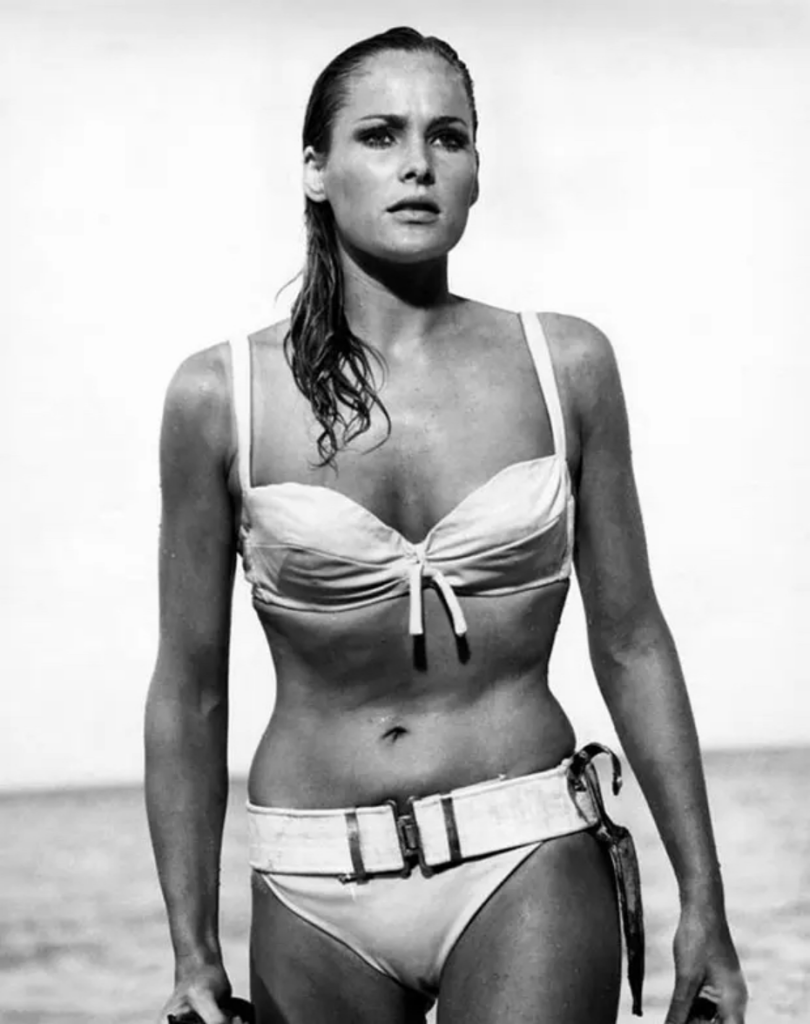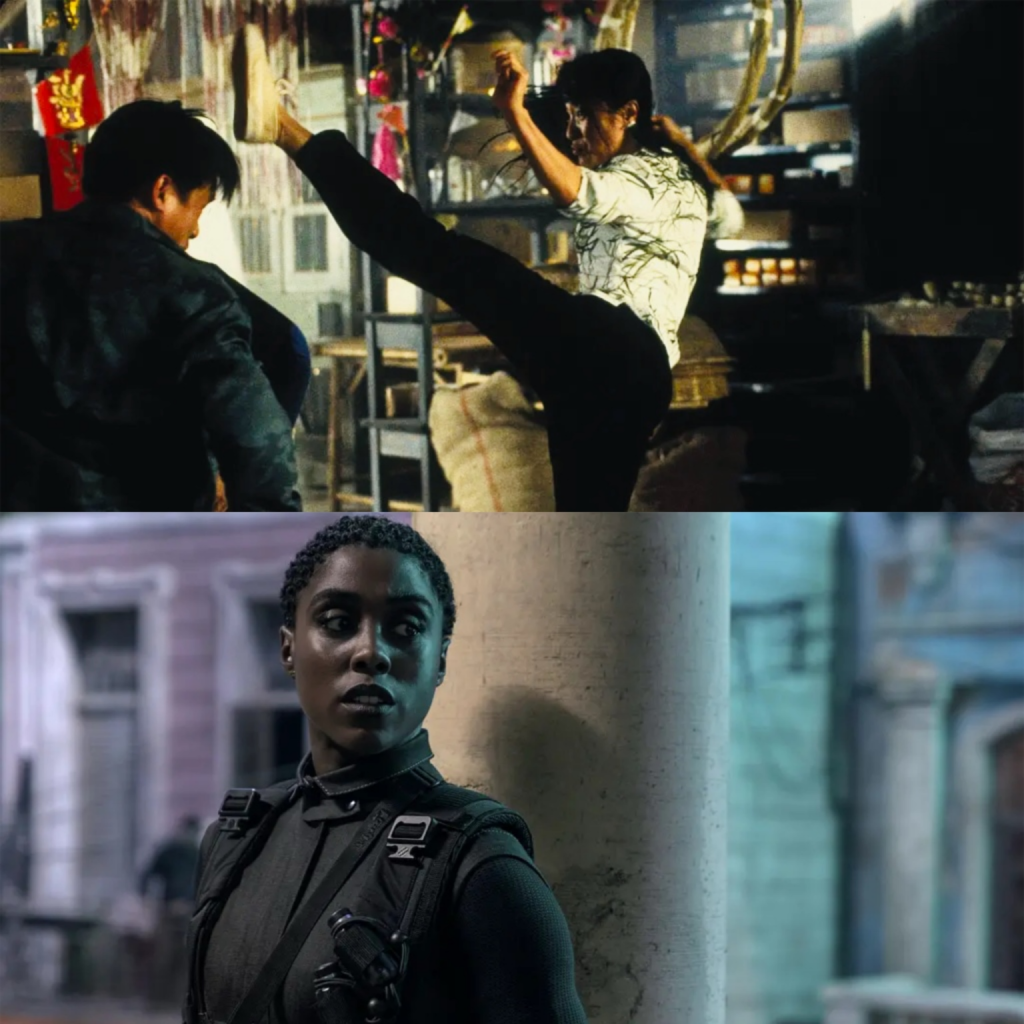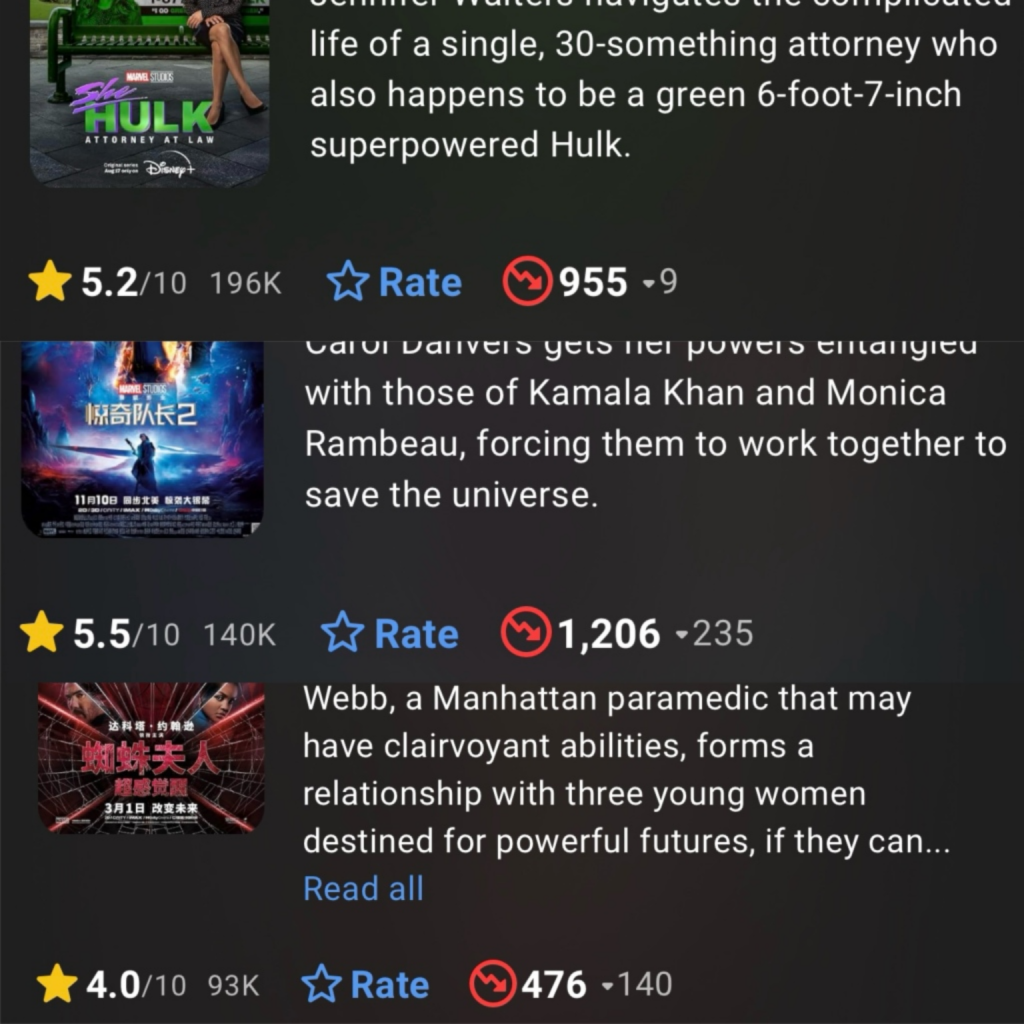As an important medium of information dissemination, film even serves as a form of historical record to a certain extent, and we can observe the social customs and cultural backgrounds of a particular period through the cinematic works of that time.(Rosenstone,2017).
Taking Hollywood as a prime example, for an extended period of time, certain mainstream films were heavily laden with elements of the male gaze, primarily due to factors such as power dynamics and gender ideologies. As Mulvey (1975) emphasizes, the male gaze signifies the representation of women in visual media predominantly from a male perspective. This implies that the portrayal of women often serves the primary function of catering to and pleasing male audiences. A closer examination of the films from the so-called Golden Age of Hollywood reveals that numerous motion pictures from this era were, in fact, characterized by this male gaze.

early James Bond films, such as those in the 007 series, female characters seemed to exist merely for the audience’s enjoyment and to highlight James Bond’s heroic deeds at crucial moments. Exaggerated screaming appeared to be a significant characteristic of female roles in this type of commercial film from the past.

The photograph of Marilyn Monroe that has now become a popular icon also hides behind it the disrespect and symbolization of female actors by Hollywood studios.
However, as time progresses, an increasing number of people have recognized the significant roles women play in social life. The wave of the women’s suffrage movement has also made it a general trend to stop objectifying women, giving women more opportunities to showcase their independent personalities. This reflection has also influenced the film industry, where the efforts of several generations of female practitioners have led to equal pay for equal work. Female characters in films are no longer one-sided or stereotyped. They are gradually breaking free from the stereotypes under the male gaze and finding their own paths. Film and television works are also increasingly focusing on the intrinsic value of women, creating female characters that empower themselves.(Wang & Liu, 2023).

Taking the previously mentioned 007 as an example, in the new series of films, women are no longer paper-thin characters serving merely as ornaments. Instead, they occupy important positions in the plot. Martial arts superstar like Michelle Yeoh have infused the Bond girls with the beauty of strength from the East. In the latest film, a female agent even briefly takes over the code name 007.
Indeed, the dialogue between the male and female leads in When Harry Met Sally about Casablanca brings up some interesting perspectives. The male lead, from his male perspective, stereotypically believes that the female lead should stay and choose love. However, the female lead argues that leaving Casablanca is a better choice for her as a woman and can bring more benefits to both herself and the collective. These words reflect the struggle of women to break free from male gaze.
The admirable Emma Thompson delivers a daring nude performance in Good Luck to You, Leo Grande, which seems to be one of the few films that allow us to confront not only the stereotypical playboys portrayed in previous media works but also the right of even older women to pursue a new life and face their own sexuality and desires. Women are never derivative of men; they too have the agency to choose their own lives.
However, there are also some film and television companies that have not truly delved into this topic. It seems that women and minorities are merely emotional cards they play to make money. I believe that this irresponsibility towards works and audiences is the biggest form of male gaze today, and the greatest insult to women and minorities.

In conclusion, I believes that as society becomes more open and inclusive, male gaze is no longer acceptable in the film and television industry. Women’s strength and individuality can be more fully displayed in works. However, we must also guard against this mindset being stereotyped and controlled by large capital companies and extremists.
Reference:
https://www-taylorfrancis-com.uow.idm.oclc.org/books/mono/10.4324/9781315113654/history-film-film-history-robert-rosenstone Rosenstone, R. (2017) History on Film/Film on History, 3rd Edition, chapter 9, pp 8.
https://wepub.org/index.php/TSSEHR/article/view/49 Liu, Z & Wang, R. (2023) Stereotypical Representations of Female Characters in Film and Television in the Context of the Male Gaze and Their Breakthrough, Vol. 1 (2023): 4th International Conference on Humanities, Arts, and Social Sciences (HASS 2023).
Mulvey, L. (1975) Visual Pleasure and Narrative Cinema. Film: Psychology, Society, and Ideology, pp. 803-816. Available at: https://learning.westminster.ac.uk/ultra/courses/_98071_1/outline/file/_5383261_1. (Last accessed: 28.11.2024)


This blog gives a clear analysis of how the male gaze has influenced the portrayal of women in films, especially in Hollywood. It traces the historical representation of women, from the early James Bond films and Marilyn Monroe’s famous image to the more recent, empowering roles in films like the new 007 series and Good Luck to You, Leo Grande. These examples show the progress made in moving away from objectifying women and allowing them to have more control and depth in their roles. The blog also mentions the negative aspects of the industry, pointing out that some films still use women and minorities for profit, which is an important issue. This highlights the ongoing challenge of making sure that positive changes are not overshadowed by business interests that may continue to reinforce stereotypes.
I agree with the blogger’s idea that, as society becomes more inclusive, the male gaze is becoming less acceptable. However, I think the discussion could go further by looking at how the film industry can continue this positive change. One area that could be explored more is the role of women behind the camera: directors, writers, and producers, who are key in making sure female characters are shown in a real and complex way. Encouraging more women to take on these creative roles could help the industry make even bigger strides toward a future with more diverse and empowering female representation. I hope my little suggestion is helpful to you.
Hello, I like your blog! You have shown a lot of examples from movies to illustrate the real significance of the male gaze, which greatly helps everyone understand it better. However, the male gaze is embedded in film and television works in diverse ways, such as through camera shots, dialogue, and even the pacing, story structure, and placement of women in the narrative. I think what we most need to do is to truly recognize where the male gaze exists and try to stop it, rather than being confined by simple definitions and becoming someone else’s weapon.
This blog explains well how films have changed over time, moving away from the male gaze to show stronger, more independent women. I like the examples of the new 007 movies and *Good Luck to You, Leo Grande*, which prove women can have real depth in stories. However, I agree with the concern that some companies still use women and minorities just to make money. This feels dishonest and keeps old stereotypes alive. Films should focus on real change, not just profit. Overall, the blog gives a good mix of progress and the challenges still ahead.
Hi boning, you have an interesting perspective on this blog! Your entry point to this topic is that the objectification and gendering of women in film is gradually being reflected upon as a result of socio-cultural changes, particularly the rise of female consciousness and the push for female suffrage.
I agree with your point about the male gaze in cinema gradually being challenged and changed, especially as current film and television productions reimagine female characters, giving them greater independence and versatility.
And I am concerned that you have supported your point through several classic examples, such as the early James Bond films, the portrayal of Marilyn Monroe, and modern films such as Good Luck, Leo Grande, showing how the male gaze has shaped the female characters in cinema, and elaborating on the shifts in the film industry’s representation of female characters by comparing and contrasting historical and contemporary works.
I feel that in the future we can also look at: the impact of power structures within the film industry on gender expression. In Hollywood, despite the shift towards female empowerment, there are still deep-rooted issues of gender inequality within the film industry, such as the continued under-representation of female directors, writers and producers, which limits the diversity of female characterisation. Your reference to Michelle Yeoh’s transformation as a Bond Girl is undoubtedly a very positive example, but it can also be contrasted with the current male-dominated system of producing, directing and screenwriting, which further illustrates that despite the gradual diversification of women’s roles in the film industry, a fundamental change in the structure of gender inequality still requires greater efforts. More effort is needed to truly change the structure of gender inequality at the root.
After reading the article, I learned about the evolution of the male gaze in films. With social progress, female characters in movies have gradually moved away from traditional male gaze portrayals, showing more diversity and independence. I noticed that as women’s status in society improves, the film industry has started to reflect and change how women are portrayed. I also understood the historical evolution of the male gaze, and the specific examples in the article provided insights into the transformation of female character images, which are both meaningful and inspiring.